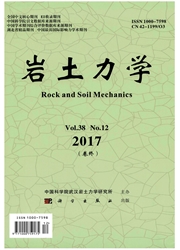

 中文摘要:
中文摘要:
利用能够反映岩体水力性质空间变异特性的随机连续模型对隧洞开挖过程中的裂隙岩体渗流-应力耦合过程进行了数值分析。随机渗透系数场通过顺序指示模拟方法生成。顺序指示法是一种非参数地质统计学技术,他允许输入任何形式的渗透系数概率分布而不需要对分布做任何假设。由随机模拟生成的渗透系数场被投影到有限元计算网格中进行耦合分析。力学响应使用基于连续介质的节理本构模型来反映岩体中软弱面的影响。结果表明,随机连续模型能够较好地预测裂隙岩体的稳定入渗率,水力性质的空间变异性对裂隙介质的耦合过程起着重要作用。在不排水条件下,隧洞每次开挖开始时,由于岩石应力重分布,孔隙水受到扰动,短时间内不能流动平衡,因此孔压会迅速上升,这对于围岩稳定是不利的。
 英文摘要:
英文摘要:
The coupled hydro-mechanical processes in fractured rock during tunnel excavation are analyzed, using the stochastic continuum model that represents the spacial variability in hydraulic properties of fractured rock mass. The stochastic permeability fields are generated with the sequential indicator simulation, which is a non-parametric geostatistical technique and allows the input of the permeability probability distribution of arbitrary shape. The resulted permeability fields are then mapped onto the 3D finite element grids for the coupled hydro-mechanical analysis. A joint material model that can represents the weaken planes with specific orientations is used for the mechanical calculation in the study. The results show that the stochastic continuum model can predict the inflow rate into the tunnel; and the natural, spacial variability in hydraulic properties plays an important role in the coupled hydro-mechanical processes of the fractured rock mass. It is also found that the pore pressure will rise quickly before the water has a chance to move and equilibrate at the beginning of every excavation stage. This transient coupled hydro-mechanical effect may cause local failures in rock.
 同期刊论文项目
同期刊论文项目
 同项目期刊论文
同项目期刊论文
 期刊信息
期刊信息
